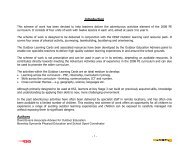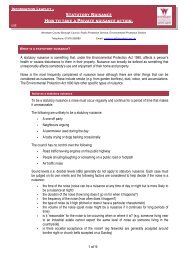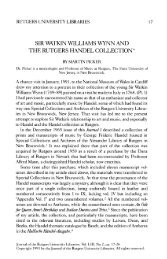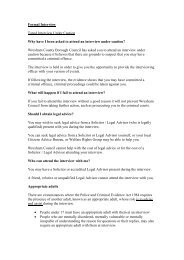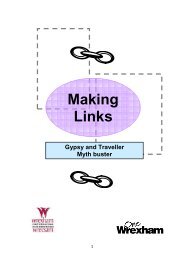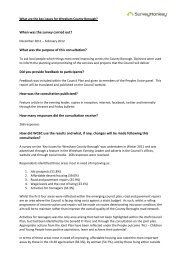Living With Urban Foxes Leaflet - PDF version 494Kb
Living With Urban Foxes Leaflet - PDF version 494Kb
Living With Urban Foxes Leaflet - PDF version 494Kb
- No tags were found...
You also want an ePaper? Increase the reach of your titles
YUMPU automatically turns print PDFs into web optimized ePapers that Google loves.
<strong>Foxes</strong> are both inquisitive and very playful like dogs. This means they are not only scent mark objectsthat interest them but are also quite likely to play with or chew them.Gardening shoes, gardening gloves, anything made of leather, balls left in the garden, dog chews another pet toys and clothes hanging on washing lines are all played with, chewed or in the late spring /early summer, removed to take back to the earth for the cubs to play with.The only recourse is to ensure that you do not leave such items in your garden overnight if foxesfrequent the area.Why do foxes foul my garden?<strong>Foxes</strong> use faeces to mark their territory; that is why the faeces are always left in conspicuous places, eg:on top of a compost heap or on garden walls. Excessive fouling is often due to immature foxesattempting to create their territories or where several foxes are competing for a vacant territory.Once a fox has established a route through your garden, it can be very difficult to stop it. An adult foxcan pass through a hole 4" (10cm) square and can scale a 6ft (2m) fence or wall with ease.It is extremely difficult to stop foxes passing through your garden. Any measures taken are best carriedout during late summer and autumn. This is the time that cubs become more adventurous, the familygroups are starting to break up and the foxes are endeavouring to establish new territories.It is rare for this nuisance to be anything more than occasional and although fox faeces are very smelly,they pose little disease risk. <strong>Foxes</strong> are prone to many of the same diseases and parasites as domesticdogs, including the roundworm Toxocara canis, the larvae of which can cause blindness in children.However, the chance of catching this from foxes is remote and so far there are no known cases ofchildren contracting toxocariasis from foxes.Can I stop foxes digging up my lawn?Yes, this is comparatively easy. <strong>Foxes</strong> dig shallow holes in lawns, bowling greens or playing fields whenthey are hunting for earthworms and grubs; they eat a large number of cutworms (the caterpillars ofmoths) and beetle larvae, such as wireworms. These only come near the surface of the lawn in wetperiods and so this sort of damage is seasonal. It occurs mainly in wet springs and warm wet autumns.If the damage is not too severe you can ignore it and it will cease as soon as the weather changes. Youcan then repair the lawn. Otherwise, you can remove the grubs and earthworms in the lawn using acommercially available insecticide and vermicide available from garden centres and DIY stores. Thiscourse of action should only be considered in extreme circumstances, due to the need to reduce the useof all pesticides in the environment.Very occasionally, foxes dig much deeper holes in lawns or bowling greens. These can sometimes behalf a metre or more deep and the lawn looks like a battlefield. This usually occurs when a blood orbone-based fertiliser has been applied to the lawn. The foxes think there is a corpse and beingscavengers, frantically dig to find it. All you can do is wait for the rain to wash the fertiliser deeper so



